Cannes 2018 Days 3 & 4: Tragic Love, Maternal Love & Mads Mikkelsen

Gus is a 3rd year English Lit and Creative Writing…
Cannes you believe we’re a third of the way through the festival already? Traversing a sea of black ties, dresses, and those tiny dogs you can pick up and put in your purse (though you better check it’s your dog first), I’ve managed to find my way into six different screenings (or five different screenings and whatever Godard‘s The Image Book is).
It’s been a crazy few days, and the rest of the fest can only get crazier – there’s only so much more my brain can take before it decides that four hours sleep and five hours queuing is no sustainable way to go about your day. Here are my thoughts on those six films:
Cold War (Paweł Pawlikowski)
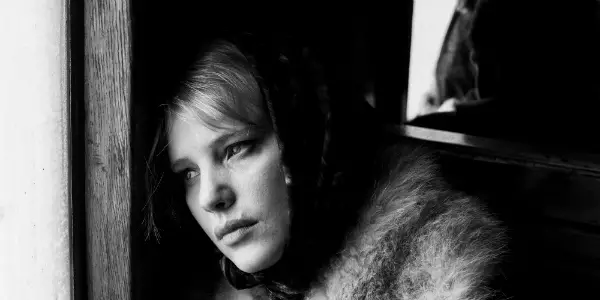
Continuing Paweł Pawlikowski’s fixation on coping in a post-war climate from Ida is Cold War, a swooning anti-romance that’s gorgeously framed, even if it did leave me a little, well, cold. A folk ensemble judge and composer, Wiktor (Tomasz Kot), falls for a (refreshingly thorny) female singer, Zula (Joanna Kulig), in the war-torn landscape of 1949 Poland. What follows is a concise epic that spans fifteen years and four countries.
Ravishingly shot, Pawlikowski utilises monochrome cinematography to the same effect as Ida, exaggerating the desperation of a country that has lost its soul, and a romance that’s trying to find its own. Wiktor and Zula seem a mismatch, but it is this tension between man and woman, connection and the longing for one, that etches out a reason for their love to exist; Cold War relies on this antithesis to make up for a noticeable lack of establishing character.
Their relationship is jittery and disjointed; it may be difficult to empathise with their characters, but it’s easy to empathise with the situation they find themselves in. A short runtime does a disservice to their progression – the country-hopping and irregular meetups not given time to breathe, though perhaps that’s the point – they both lack agency in their relationship, and are dictated by the whims of their era. As a romance, Cold War wobbles, but the allegory that the pairing represent is sharply defined and suitably harrowing.
Arctic (Joe Penna)
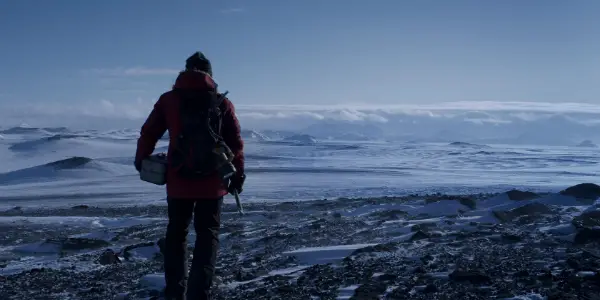
It’s difficult to get a survival movie right, they’ve been tread on to the point of oblivion, but here, Penna takes full advantage of the genre’s tropes, and, rather than subverting them, builds on them to create something deeply engrossing. We arrive in media res, as Mads Mikkelsen’s crash-landed pilot – stranded in the middle of a vast white canvas – has already adapted to life in the snow.
He fishes, carves out SOS signs in the ice, and winds a black box-esque contraption to call for help. It’s only when a helicopter arrives to save the day – and promptly nosedives into a rock face – that he realises that his best chance of survival is to be on the move. The film plays out almost as a silent movie, Mikkelsen’s pilot a hulking figure that grunts in a babble of Danish and English, and for the sheer confidence Penna shows towards his star man to carry the film, it’s an admirable, constantly gripping watch.
The film finally gives way to farce towards its end, but most of this intensely watchable survival film impresses in its realism; an endeavour with a cliff face is played out in agonising fashion, and I mean that in a good way. A slew of survival films rely on thin backstories and forced drama to eek out emotion – Arctic is the polar opposite (if you pardon the pun).
The Image Book (Jean-Luc Godard)
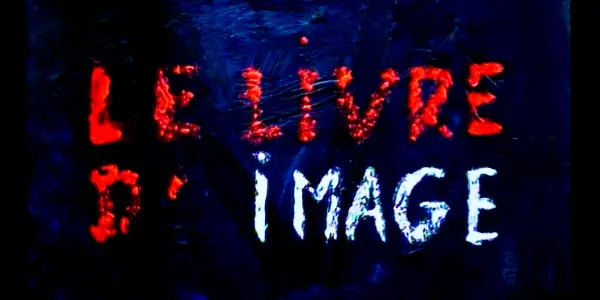
What to say about Jean-Luc Godard’s latest essay? It’s as incomprehensible as you’d expect, and then some. Making headway into its collage (though ‘collage’ would imply cohesion, which this refuses to indulge in) of images, movie references, quotes and subtitles is as difficult as giving a synopsis.
Impenetrable though this may be, The Image Book is fascinating, beguiling, often terrifying. Godard toys with sound and framing to full effect, immersing the viewer in a cinephiliac odyssey that juxtaposes Michael Bay flicks with beheadings, self-narrated speeches interrupted by explosions, you name it. I can’t definitively say what it’s about, but it’s a film concerned with violence, orientalism, the relationship between film and audience or between terrorism and art. At least, I think so.
At one point, I began drawing parallels between the black-and-white imagery of the silent era (the eye-cutting clip of un chien andalou, for instance) and the ISIS flag that shares its palette. After all, what’s the difference between slicing open an eye or a neck? This may be a misreading, or one of many, but The Image Book goads you into such an act. It’s thrilling stuff – I could easily have watched an hour more – but impossible to truly analyse on first viewing.
Ash is Purest White (Jia Zhangke)
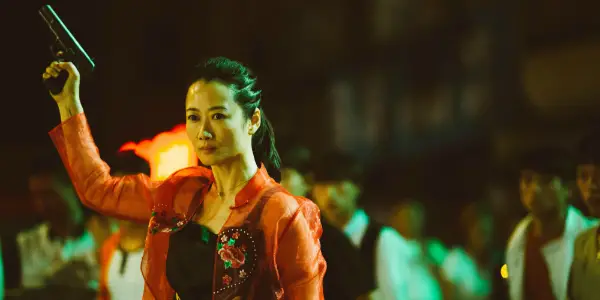
Jia Zhangke’s ambitious, unpredictable, and – let’s face it – sillier follow-up to A Touch of Sin is a decade-spanning tragi-romance epic (though not in the same vein as Cold War) that examines the relationship of a Chinese underbelly gang leader and his lover. Zhao Tao, in a remarkable performance, plays the lover, who lies about a crime to protect her boyfriend and is promptly sent to jail for five years. Upon release, she travels through China to find him again.
It’s a story that takes turns and detours, jolts between peddling for time and well worth your time – a mundane conversation in a car transforms into a martial arts fist fight, and a middle act stretch seems largely irrelevant. There’s a glorious ballroom dance that follows a YMCA sequence, a lusty motorcyclist whose clumsy plans are derailed, and a UFO even crops up at one point. But at the core of Ash is Purest White is a heartfelt romance that evokes Wong Kar-Wai, and is admirable in its intentions, even if it’s spread thin over the course of a sprawling runtime.
The narrative itself is so erratic that I began looking for an allegory to rationalise it: Ash is Purest White is an ode to (or lamentation of) the permanence of love, in the face of a startling impermanent world. That doesn’t quite explain away how much of the film feels tangential, nor is it executed quite as well as it should be; the representation of modernity feels lazy, electronic props tacked on without quite evoking the contemporary era. But it does inject a gravitas that makes the film a worthwhile addition to Zhangke’s impressive filmography.
Angel Face (Vanessa Filho)

Marion Cotillard may be the draw for this addition to the pantheon of recent daughter-and-irresponsible-mother films (The Florida Project says hi!) but the responsibility remains firmly on the shoulders of the young Ayline Aksoy-Etaix. She plays Elli, a mistreated child who gradually takes after her mother (to a farcical, clumsily portrayed extent). Cotillard disappears after a night out partying, and so like mother, like daughter, 11-year-old Elli sets her sights on the booze.
It begins brilliantly, framed with intensity and bathed in swathes of reds and purples – as the film progresses, however, Angel Face disheartening loses its rhythm and descends into perplexing territory. A former diver that Elli takes on as a father figure is a confusing choice of subplot, its aimlessness given evidence by an untidy resolution.
Though much of the messiness is fitting for the young girl’s wayward life. Her exploits in school alternate between stretching plausibility and genuine tragedy, while there’s a certain charm to be found in watching Elli eventually come to terms with her mother’s inability to, well, mother. Angel Face meanders and mopes to an irregular rhythm, but strong performances and a well-judged relationship between mother and daughter keep the beat alive.
Girls of the Sun (Eva Husson)
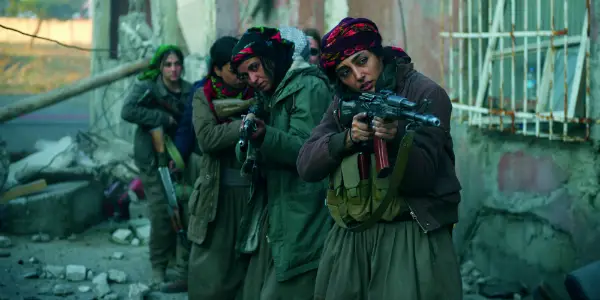
Eva Husson’s feminist war film is a well-intentioned documentation on the importance of female fighters, but lacks any nuance or subtext; what we end up with is a frustratingly skin-deep recollection of significant events. Based on a true story, we see a journalist (the very-Cate-Blanchett-looking Emmanuelle Bercot), join an all-girl army squad in Kurdistan in attempting to liberate the hometown of their leader, Bahar (Golshifteh Farahani) from a group of extremists.
Farahani is good, at least – fierce and fiercely believable – which is more than can be said about the film as a whole. Interspersed flashbacks remove Girls of the Sun of its urgency, and, harrowing though they may be, are told to us as if ticking off a checklist; there’s no tension involved when the main character’s sitting there retelling how she survived. Even more damning is the overwrought score, which cuts short the inherent dramaturgy of their story.
The reason why films like Wonder Woman work as significant feminist hallmarks is that they function beyond the scope of their inherent importance. Girls of the Sun is a story worth telling, but Husson leans on its feminist angle without giving room for the characters themselves. Signalled by a queasy score and a gaggle of clichéd set pieces, the titular girls act less in service to themselves and more in service to Husson’s idea of stating the obvious (epitomised by a needless ending rallying cry). These girls are incredible, but to reformat their endeavours as an over-boiled feminist statement, rather than acknowledging their actions as inherently feminist, is to do them a disservice.
Does content like this matter to you?
Become a Member and support film journalism. Unlock access to all of Film Inquiry`s great articles. Join a community of like-minded readers who are passionate about cinema - get access to our private members Network, give back to independent filmmakers, and more.
Gus is a 3rd year English Lit and Creative Writing student who loves everything film and still doesn't understand why he didn't study that instead. He is the co-editor for Venue, the arts supplement of his Uni's newspaper, and has written for Little White Lies, ScreenRant, Dog and Wolf, BritFlicks and Outline Norwich.













